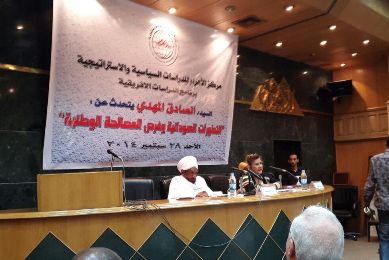Mahdi says his return to Sudan depends on political developments
September 28, 2014 (CAIRO) – The leader of Sudan’s opposition National Umma Party (NUP), al-Sadiq al-Mahdi, said he would return to the country when the dialogue process requires his presence in Khartoum.

Al-Mahdi, who spoke in a public lecture at Al-Ahram Center for Political and Strategic Studies in Cairo on Sunday, said he will return to Sudan if his party’s institutions take decision to that effect or if the national dialogue led by the African mediation requires his presence in Sudan.
The NUP leader added that he can also return to Sudan after he finishes his mission abroad which aims to strengthen ties between Paris Declaration forces and its regional and international supporters besides conducting contacts in order to obtain promises from international bodies for cancelling Sudan’s external debt, lifting economic sanctions and providing development materials.
Since the signing of Paris Declaration on 8 August with the rebel Sudanese Revolutionary Front (SRF), the 79-year old opponent was advised to not return to Khartoum. His daughter and NUP deputy leader, Merriam al-Mahdi, was jailed for a month before her release.
Since his arrival in Cairo last August, the NUP leader held a series of meetings with the Egyptian officials and foreign diplomats there to explain the Paris Declaration. He travelled to the United Arab Emirates and Addis Ababa where he met with the AUHIP chief.
Al-Mahdi disclosed that the Paris Declaration signatories handed Mbeki over a letter containing a roadmap for national salvation and just and comprehensive peace.
He said the roadmap urges the regime to make several moves including recognition of the SRF as a partner, applying confidence-building measures, meeting with rebel groups to reach a cessation of hostilities, allowing humanitarian aid to the conflict affected zones and exchanging prisoners of war.
According to the former prime minister, the roadmap also calls for holding a national constitutional conference inside Sudan to reach an agreement on several issues including just and comprehensive peace, governance, constitution and a transitional period.
The veteran politician seemed confident about the unity of the opposition forces over the roadmap, saying the regime has either to accept it by accommodating the CODSA experience in South Africa or to refuse it and face domestic, regional and international isolation.
He stressed that the atmosphere in Sudan is conducive for “a decisive popular uprising”. He further emphasised that Paris Declaration realised new meanings for national destiny including unequivocal change of balance of forces in the country, referring to the adoption of principles to change the regime through political means besides the active involvement of the Arab League, African Union, Egypt and IGAD bloc in the Sudanese affairs.
The former prime minister warned the regime against being included among those who defend the Muslim Brotherhood, describing the latter’s experience of governance in Sudan and Egypt as “suicidal plan”.
He said the Muslim Brotherhood organisation has to make a self-criticism for their experience in Sudan and Egypt, advising them to accommodate the brotherhood experiences of reconciling with the civil state and plural society in Tunisia, Morocco and Indonesia.
Al-Mahdi further said the Sudanese government faces 61 resolutions issued by the United Nations Security Council (UNSC), noting that most of these resolutions are under chapter seven.
“However if it [the government] responds to the national agendas, Sudan’s problems with the international community could be resolved and if it continues to monopolize power, the current embargo will be strengthened,” he added.
He said the Sudanese popular forces of change will make several moves including a call for regional conference on security issues, twinning with South Sudan, integration with Egypt that could include Libya in the future besides normalising Sudan’s relations with the international community.
The NUP leader said the national dialogue committee known as 7+7 faced several obstacles, including insistence of the ruling National Congress Party (NCP) to chair it, saying his party saw the committee should appoint a neutral chairperson.
He said the other obstacle was the regime’s use of tribal militias to fight against rebel groups, noting that was the reason why he called for investigating atrocities committed by these militias including war crimes in order to avoid an international investigation that would repeat Sudan’s experience with the International Criminal Court (ICC).
Mahdi also said that the regime did not tolerate his “objective criticism” and fabricated charges to arrest him.
“I say it was fabricated because the charges were filed under article (50) of the criminal code which talks about acts to overthrow the regime by force and I did not say anything that could be interpreted as an action to topple the regime by force,” he added.
Al-Mahdi, who was a fervent supporter of the national dialogue, had been arrested for one month from May to June for criticising atrocities and war crimes committed by the government militias in Darfur.
Following his release, he distanced himself from the internal process and called to include rebels in the national dialogue. He further demanded to issue a law protecting political freedoms before to launch the political operation.
(ST)
